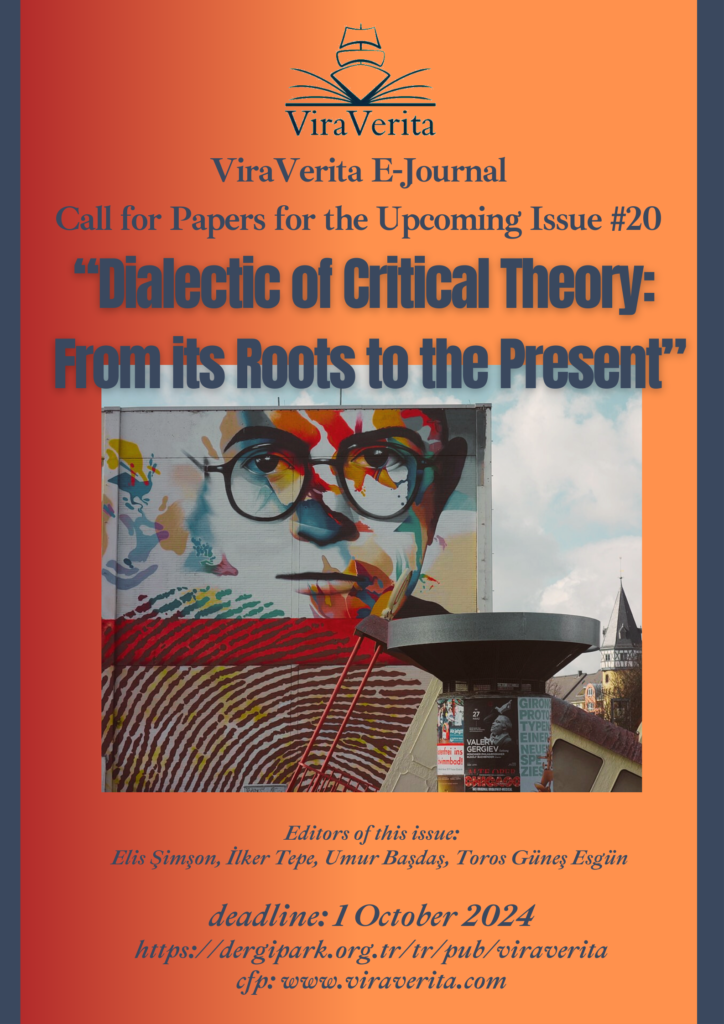Forthcoming Issue (Issue 20st-2024-Fall)
Issue 20
Call for Papers:
“Dialectic of Critical Theory: From the Roots to the Present”
Deadline: March 20th, 2024
Editors: Elis Şimşon, İlker Tepe, Umur Başdaş, Toros Güneş Esgün
- In its 20th issue marking the tenth anniversary of its launch, ViraVerita invites scholarly examination of the Critical Theory tradition, which acquired its name from the Frankfurt School and celebrated its centenary in 2023 but extends well beyond its original framework and context of 1923.Amidst current debates, there is a prevalent notion that Critical Theory faces a crisis today and has deviated from its original radicalism. However, contemporary thinkers who persistently adhere to Critical Theory continue to be influential in various ways. As we confront the problems of our age –disasters, wars, and poverty– which are indeed quite similar to those of past periods, what can we say about the current state of Critical Theory, which has claimed to critically speak about the existing social situation since its foundation?If Critical Theory were to be deemed obsolete today due to its alleged departure from its roots, as represented by figures like Adorno and Horkheimer in 1923, such a proclamation would be invalid. This is precisely because the most distinctive feature of Critical Theory lies in its perpetual critique, even self-critique. However, if this assertion implies that despite diverging from its roots, Critical Theory has failed to effectuate social transformation, then we must evaluate our understanding of “critique” and consider how to sustain it in contemporary conditions: Just as the Enlightenment’s promise underwent critical scrutiny in the book Dialectic of Enlightenment, it is a timely imperative to scrutinize the “Dialectic of Critical Theory” critically. Many critical theorists, such as Axel Honneth, Nancy Fraser, and Rahel Jaeggi, engage in such reflection when pondering the current state of Critical Theory. However, this questioning not only entails an internal debate carried out within Critical Theory but also entails a reassessment of the areas that critical theorists are concerned with. Hence, our inquiry delves into both the methodological aspects of theoretical activity and its relationship with life and current social issues.Since its foundation, ViraVerita has embraced an interdisciplinary approach, bridging theory and life while addressing contemporary issues. In its 20th issue, alongside criticizing Critical Theory, ViraVerita recognizes the importance of exploring potential new areas of inquiry that may arise from this critique and facilitate interdisciplinary dialogue from a contemporary standpoint. In this context, we aspire to discuss the opportunities opened up by Critical Theory and the horizons it may have missed, within a broad scope that extends to various other thinkers who show affinity with Critical Theory, including representatives from all generations of the Frankfurt School, such as Benjamin, Arendt, and Foucault. While doing so, we seek to spread across various fields such as philosophy, art, sociology, psychology, political economy, cultural studies, communication studies, and law. By inviting authors to interrogate the “Dialectic of Critical Theory” from its origins to the present, we aim to collectively contemplate new areas of inquiry where Critical Theory could be applied today.We welcome your contributions in the form of research articles, book reviews, compilation articles, and translations, not limited to the suggested topics provided under the title “Dialectic of Critical Theory: From its Roots to the Present,” until October 1st, 2024. Submissions can be made via https://dergipark.org.tr/tr/pub/viraverita, where detailed information about the journal is available. Contributions may encompass various topics associated with the aforementioned theme.
E-mail:viraveritaeditor@gmail.com
Suggested Topics:
Critical Theory in the 21st Century
Anticipations and Misjudgments of the First Generation of the Frankfurt School
Frankfurt School Beyond Borders: The Effects of the Frankfurt School in the World
Critique as Method
Critique of Dialectics
Relationships of The Frankfurt School Thinkers with the History of Philosophy (Kant, Hegel, Marx, Nietzsche, Kierkegaard, Heidegger, etc.)
Thinkers on the Periphery of the Frankfurt School
Critical Theory and Gender: Feminisms and Queer Theory
Critical Theory, Post-Colonialism, and Decolonialism
Critical Theory and Critiques of Capitalism
Critical Theory and Nature
Critical Theory and Aesthetic Theory
Critical Theory in Cinema and Literature
Critical Theory and Communication Studies
Perspective Analysis in Critical Legal Studies: Yesterday – Today – Tomorrow
Discussion of Radicalisms and Critical Legal Discourse
Critique of Psychology, Psychoanalysis, and Critical Psychology
Critical Theory and Analytic Philosophy
Critical Phenomenology
Critical Sociology and the Transformation of the Social
Critique of Emotion, Experience, and Practices
Critical Theory and Social Media
Critical Technology Studies and/or Science, Technology, and Society (STS) Studies
Transformation of the Culture Industry, Happiness Industry, and Emotional Capitalism
Critical Theory and Genocide
Cosmopolitanism, Nation-State, and Critical Theory
Critical Pedagogy and Enlightenment
Critical Theory Studies in Turkey
Critique, Crisis, Resistance, Solidarity

